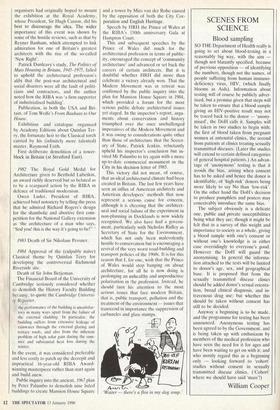SCENES FROM SCIENCE
Blood sampling
SO THE Department of Health really is going to set about blood-testing in a reasonably big way, with the aim though not blatantly specified, because of previous opposition — of identifying the numbers, though not the names, of people suffering from human immuno- deficiency virus, HIV, (which finally blooms as Aids). Information about testing will of course he publicly adver- tised, but a promise given that steps will be taken to ensure that a blood sample giving an HIV-positive result may not be traced back to the donor — `anony- mised', the DoH calls it. Samples will be taken in two studies to begin with; the first of blood taken from pregnant women at antenatal clinics, the second from patients at clinics treating sexually transmitted diseases. (Later the studies will extend to certain defined categories of general hospital patients.) An advan- tage of `anonymous' testing is that it avoids the bias, arising when consent has to be asked and hence the donor is identifiable, of 'high-risk' donors being more likely to say No than 'low-risk'. On the other hand the DoH's decision to produce pamphlets and posters may conceivably introduce the same bias.
The subject obviously is a delicate one, public and private susceptibilities being what they are; though it might be felt that in a survey of this weight and importance to society as a whole, giving a blood sample with one's consent or without one's knowledge is in either case overriding)/ to everyone's good. However the DoH will guard the anonymising. In general the informa- tion attached to the tests will be limited to donor's age, sex, and geographical base. It is proposed that from the sexually transmitted disease clinics should be added donor's sexual orienta- tion, broad clinical diagnosis, and in- travenous drug use but whether this should be taken without consent has still to be decided.
Anyway a beginning is to be made, and the programme for testing has been announced. Anonymous testing has been agreed to by the Government, and is being taken up with enthusiasm by members of the medical profession who have seen the need for it for ages and have been waiting to get on with it; and who mostly regard this as a beginning only — looking forward to 'cohort' studies without consent in sexually transmitted disease clinics. (`Cohort' where we should have said `mass'!)
William Cooper










































 Previous page
Previous page